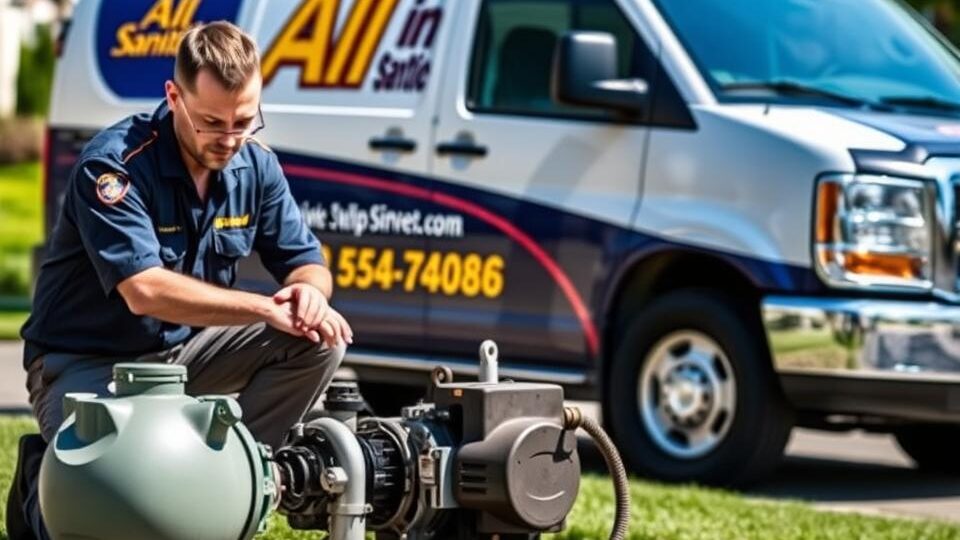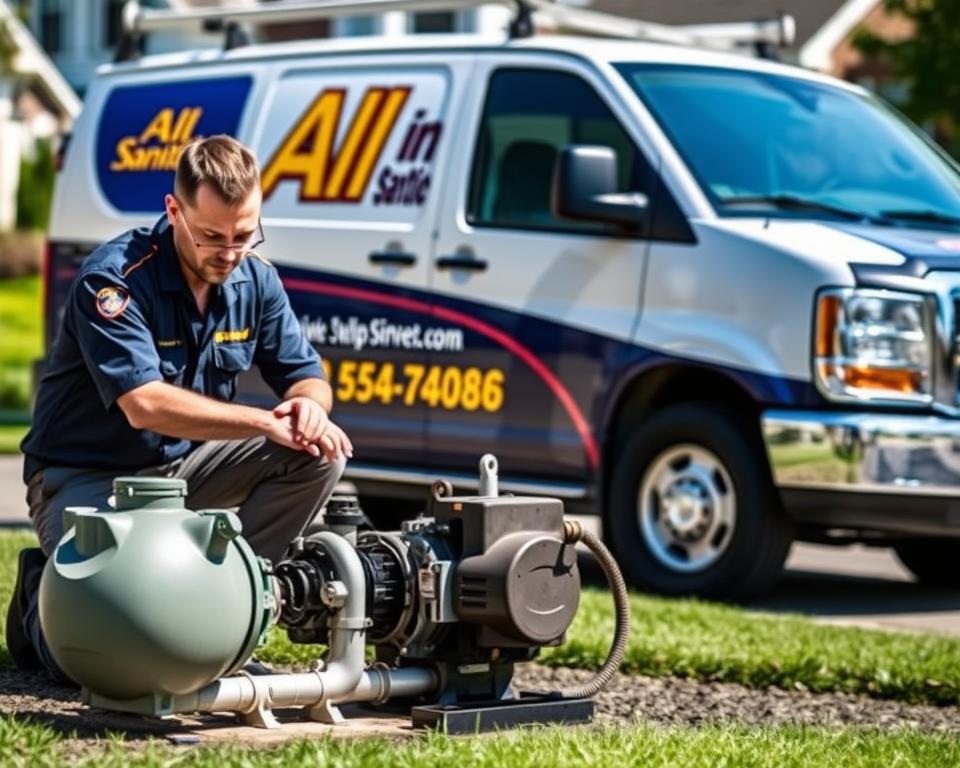
The Lifesaving Role of Emergency Septic Service in Barstow
Septic Tank Pump Swap: Step-by-Step Guide
Have you considered the aftermath of a Septic Tank Pump shutdown? For many, it’s a scenario that leads to considerable distress and unexpected expenses. Identifying the requirement for quick replacement is critical in keeping a smooth and hygienic Septic system. By observing routine inspections, including prompt repair needs, you lengthen your system’s life while preventing expensive emergencies. Companies like All in Sanitation serve a pivotal part in helping keep your Septic tank operating smoothly. This guide delivers a concise insight of Septic Tank Pump replacement, exploring indication signs and service pointers for septic tank services.
Vital Takeaways
- Comprehending the role of a Septic Tank Pump is vital for homeowners.
- On-time Septic Tank Pump replacement can reduce long-term expenses.
- Routine upkeep and cleaning are central to extending the lifespan of your Septic system.
- Skilled support can competently oversee Septic system Pump repair and maintenance.
- Identifying early signs of Pump failure can help prevent costly repairs.
Septic System Basics
A Septic system is important for homes without access to municipal sewers. It handles and eliminates household wastewater safely. The Septic tank is key to this system’s process, acting as a key component in the process.
The Septic tank receives sewage, partitioning solids from lighter materials. This division is crucial for efficient wastewater treatment. The clarified water then enters the drain field, where it experiences further treatment by the soil, preserving groundwater.
Knowing how your Septic system operates can increase its life and efficiency. Routine maintenance is essential for the Septic tank and the system’s overall performance. Homeowners must know their system’s components to reduce ecological impact and prevent expensive fixes.
Defining a Septic Tank
A Septic tank is a in-ground, impermeable container essential in household waste management systems. It’s important to grasp the Septic tank’s main role: it manages sewage waste storage by processing it. This setup works by separating solids from liquids, promoting basic wastewater treatment and sanitation.
Its operation depends on naturally occurring microorganisms that digest waste. In locales without centralized sewage treatment, Septic tanks are crucial. They keep sewage long enough for solids to sink, forming sludge. Meanwhile, liquid effluent rises to the top, preparing for filtration in the drainage field.
Upkeeping a Septic tank in proper order is crucial for its effectiveness and longevity. Consistent servicing is central to avoiding problems like backups and overflows. These problems can result in pricey restorations and pose environmental hazards. In essence, Septic tanks are indispensable in ensuring hygiene and safety, especially in rural areas.

How to Tell a Pump Needs Replacing
Homeowners should be mindful of signs that their Septic tank may need a new Pump. A strong sign is experiencing foul odors near drains or in the outdoor area, pointing to a system failure. Experiencing regular or major sewage backups in your home requires swift action to head off worse issues.
Experiencing slow draining drains signals a potential problem. Plumbing fixtures that empty slowly might indicate a Pump failure or a clog that needs an expert’s evaluation. Additionally, areas of excessively lush vegetation in your yard could suggest trouble; this reveals waste leakage, causing overflow concerns.
To prevent serious, high-cost restoration, homeowners should deal with these clues swiftly. Carrying out regular inspections and maintenance is critical for the Septic system’s best function.
| Signs | Description |
|---|---|
| Foul Odors | Unpleasant smells around drains or yard signaling system failure. |
| Sewage Backup | Frequent backups in sinks or toilets signaling potential Pump issues. |
| Slow Draining Drains | Fixtures draining slowly can mean blockages or Pump malfunction. |
| Lush Vegetation | Areas of overgrowth near the tank indicating possible overflow. |
Pump Lifespan and Timing
Knowing the frequency for replacing your Septic Pump is vital for a well-functioning Septic system. It’s sensible to have your system assessed every three years. A skilled technician during these reviews gives information into how well your system functions.
Typically, service of the Septic tank becomes required every five years. However, households with high demand or a big family might need service more often. Proper care of your Septic system prevents expensive fixes and lengthens its lifespan. Professionals in Septic services can craft a maintenance plan that matches your usage and the characteristics of your system.
Being proactive with Septic Pump replacements ensures your system’s efficient operation and shields your home investment. Routine reviews and maintenance dodge sudden bills. They support efficient system flow.
Cost of Septic Tank Pump Replacement
The Septic Pump replacement cost differs, influenced by many aspects. Homeowners should expect spending between $500 to $1,300 for a new Pump. This price range reflects diversity in the type of Pump and material needs. It’s necessary to account for the Pump and Septic tank servicing costs for the placement and mandatory inspections.
Costs can also escalate due to problems within the Septic system or regional labor rates. Essential repairs, triggered by wear or harm, could drive up the total outlay. In reviewing financial estimates for Septic services, add charges for regular upkeep, assessments, and any unforeseen emergencies since these factors greatly help with maintaining your system’s longevity.
Setting aside money for consistent Septic service minimizes the burden of unexpected bills. Upfront planning assists residents in managing expenses associated with the Pump’s replacement and system upkeep.
Process of Septic Tank Pump Replacement
The Septic Tank Pump replacement begins with a thorough inspection of the system. This opening check spots any additional issues other than the Pump itself. The faulty Pump is then taken out carefully and swiftly.
Installing the new Pump entails precise attention to connection security, making sure no leaks. Expert crews make certain the installation is properly executed, reducing future issues.
The final step is a detailed finish inspection. It verifies proper functioning, giving homeowners confidence. With professional assistance, the process is seamless, causing minimal disruption.
Pump Installation Guidelines
When handling Septic Pump installation, it’s critical to stick to best practices. Hiring skilled professionals ensures compliance with local regulations. They expertly manage the installation intricacies, sidestepping errors common in inexperienced setups.
Following exacting Septic service standards is important for integrated function. Selecting correct components and high-grade materials prolongs the Pump’s life and optimizes the Septic system’s efficiency. This meticulous attention raises maintenance and overall performance longevity.
- Select a trusted service provider who specializes in Septic systems.
- Verify that all necessary permits and inspections are in place before work starts.
- Opt for Pumps that meet the specific requirements of your Septic system.
- Schedule a pre-installation inspection to assess site conditions.
- Keep in mind the layout and flow of the Septic system during installation.
Following these guidelines results in a seamless setup. It also delivers a dependable system for proper sewage treatment.
Septic Tank Maintenance Tips
Preventing pricey troubles with your Septic system originates with consistent service. By observing simple guidelines, homeowners can keep their Septic systems’ efficiency. Scheduling regular checks is a wise step. It helps identify and tackle problems before they become significant.
It’s also necessary to not allow flushing dangerous items down the drain. Cooking oil, chemicals, and items that don’t break down can injure your system. Decreasing water use during heavy-demand hours can also lighten the system’s burden.
Scheduling expert services with entities like All in Sanitation is crucial for Septic health. Understanding what you ought and ought not do with your Septic tank can greatly extend its lifespan and shield your household environment.
Understanding Cleaning Services
Regular Septic tank cleaning is crucial for your system’s ongoing function and efficiency. The process comprises clearing sludge, inspecting for damage, and confirming everything operates properly. These steps are necessary to keep your system running smoothly and stop costly repairs.
A comprehensive Septic maintenance plan should contain frequent checks and cleanings that align with your specific usage. Homeowners must realize the importance of timely maintenance to stop troubles like backups. Employing specialists ensures the cleaning is comprehensive, encouraging a healthier living space.
| Service Type | Frequency | Benefits |
|---|---|---|
| Pumping | Every 3-5 years | Avoids system failure and backups |
| Inspection | Annually | Spots potential issues early |
| Maintenance | As needed | Prolongs the lifespan of the system |
Committing to consistent Septic tank cleaning cuts costs and increases your system’s life. It keeps the waste management system working without issues. Acting now safeguards your Septic system’s efficiency for the future.
Selecting the Right Service
Locating a reliable Septic service provider is crucial when replacing a Septic Tank Pump. Initially, ensuring their certifications and licenses. Such credentials demonstrate the company’s compliance with industry norms, necessary for a smooth replacement process.
Examining customer reviews is also a critical step. Past feedback reveals a lot about service quality, guiding the filtering process. Select companies with a consistent track record of excellent workmanship and customer support.
Listen to recommendations from your social circle too. Insights from friends and neighbors can point to top-notch Septic services in your vicinity. Always seek detailed instances of their satisfactory experiences with these services.
Finally, compare the service scope and cost from various firms. A thorough analysis provides exceptional service and improves the value of your expenditure. Adhering to these guidelines guarantees your Septic system receives the best care it merits.
When to Consider DIY vs. Professional Help
Homeowners often wonder whether to manage Septic issues personally or call in experts. DIY Septic maintenance appears attractive for basic fixes and upkeep. For example, monitoring Septic tank levels or clearing drainage lines can be done on your own.
Conversely, recognizing when to hire Septic professionals is vital for serious problems. In-depth repair, replacing systems, or major clogs require specific equipment and skills. Without the right skills, attempts to resolve these problems can lead to environmental harm and significant harm.
Figuring out between DIY and professional help demands judging the job’s complexity. Presented below are examples illustrating when DIY is appropriate and when professional Septic services are required:
| Situation | DIY Feasibility | Need for Professional Help |
|---|---|---|
| Routine maintenance (e.g., tank level checks) | Yes | No |
| Minor clogs in drain fields | Yes | No |
| Major Septic Tank Pump failure | No | Yes |
| Complex sewage backflow issues | No | Yes |
| Regular system inspections | Possible DIY | Yes for thorough checks |
Acting knowledgeably on these matters ensures safety and efficiency. Opting properly protects as well as the Septic system but also prevents surprise expenses.
Conclusion
Grasping the workings of your Septic system is crucial for its efficient oversight and your home’s smooth running. Catching initial signals of issues helps avoid expensive repair costs and maintains the system’s wellbeing. This proactive approach supports the environment and enhances your property value.
To protect your Septic system in excellent condition, emphasize maintenance. This includes regular inspections and timely professional Pumping. This minimal cost maintains your home’s safety and your health. Your Septic system thrives with good care.
Our team at All in Sanitation is committed to delivering high-quality Septic care. We bring the experience required to guarantee your system performing at its best, securing your home investment over time. With our dedication to exceptional service and dependability, we’re ready to meet your Septic maintenance needs.